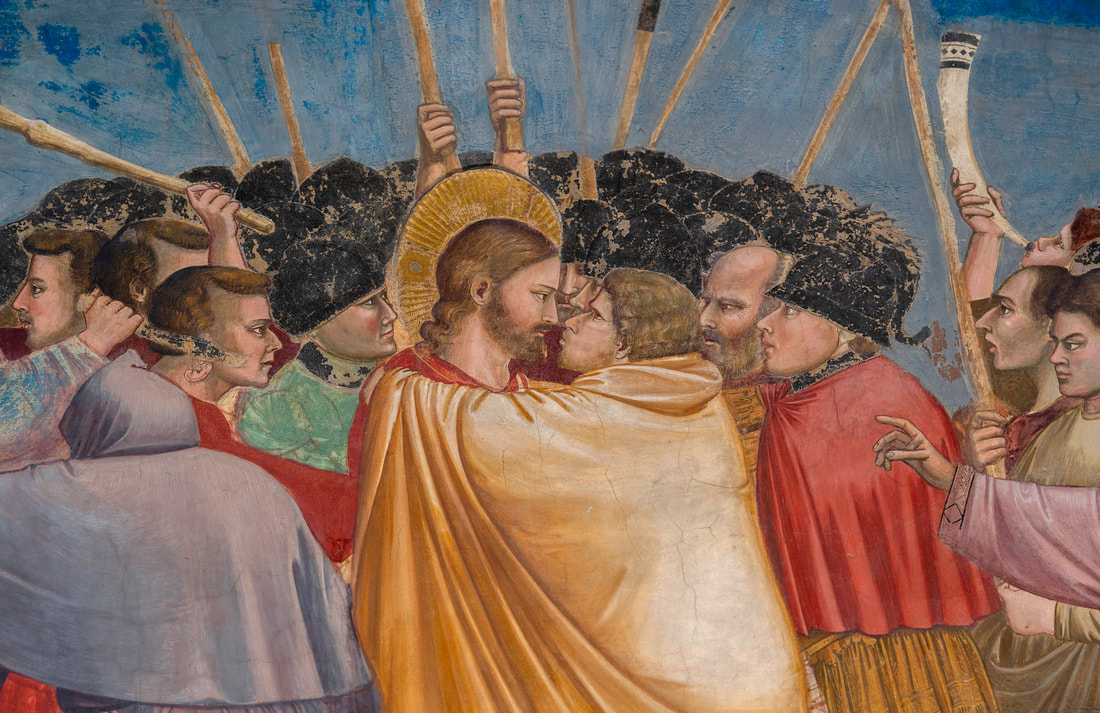|
A Christopher Wright's Sermon After the flood, sin was still rampant. Then came Abraham. God showed Abraham He would justify all nations by faith, with all nations blessed through Abraham (Genesis 12, Galatians 3:8).
God’s desire is to bring blessings to all nations. Abraham was chosen for this purpose (Genesis 18:18-19), as was Israel. Not because Israel was good, but because of His love, God chose Israel to be His witness, by which He would bring salvation to all (Isaiah 44:21). Then through Christ, salvation came to all nations, as promised in the Old Testament (OT) (Galatians 3:8; Luke 24:27, 44-47). So the mission of God’s people in the OT was to bring God’s blessing of salvation to all nations. To achieve such a mission required Biblical ways of living. Abraham and his people needed to live distinctively, following God’s righteousness and not Sodom’s way of injustice, cruelty, and wantonness (Genesis 18:18-19, 19; Isaiah 1; Ezekiel 16). Similarly, Israelites were to live following God’s teachings (Leviticus 18:3, 19:2). If so, they would be God’s priests and a holy nation (Exodus 19:4-6), bringing God to all nations and drawing them to God. That was the purpose of the OT laws, which were ultimately fulfilled through Christ. God’s people must follow God’s ways, to bear witness to and bring the knowledge of God to all. God’s people are to shine before them, attracting them to God (Deuteronomy 4:6-8, Matthew 5:14-16). Examples of witnessing in the OT include Joshua terrifying the surrounding nations and attracting people, like Rahab, to God; and the Israelites themselves being sent into exile before their subsequent return (Exodus 15:14-16; Joshua 2:8-11; Exodus 32:11-14; Ezekiel 36:20-21, 33-36). Through such witnessing, ultimately the nations will benefit and praise God. Those who choose to be God’s people will be accepted into an all-nation community that knows, worships, and loves God (Isaiah 56:3-8, Isaiah 19:19-24, Psalm 87:4-7, Zechariah 2:10-11). God’s creation will rejoice together in the coming of the Lord, culminating in the new heaven and the new earth (Psalm 96: 11-13, Isaiah 65:17-25). In the New Testament, Christians are to live following God’s teachings and obey the Great Commission. Christians are to bring God’s blessings to all and make God known to the ends of the earth. Thus, the mission of God’s people is deeply rooted in the OT. A summary of a sermon by Christopher Wright, titled, “The Old Testament Vision of God’s People”: https://www.youtube.com/watch?v=F0dFzFry7sU
0 Comments
A N.T. Wright Sermon Summary Paul ventured beyond Jerusalem to convert non-believers to Christ. To the Gentiles, Paul was crazy because Christ was crucified. To the Jews, treating Christ as their Messiah was scandalous. Paul forced both groups to ask themselves who God was, what His purpose was, and what that meant for them.
Those who accepted his message became renewed creations[1], with new eyes and new minds, growing and maturing in their new knowledge of the Creator[2]. No longer enslaved by foolish things, they saw the importance of love[3]. Their new lives centered on Christ. These transformed individuals formed a united and holy community focused on God, not on earthly things[4]. Through this community, people would see Christ as Lord[5]. Paul rooted the above in the Old Testament. Regarding the concept of only one God, as shown in Shema, the Jewish daily prayer: “Hear, O Israel, the Lord is our God; the Lord is one,” Paul refreshed this concept into one God, the Father (we live for Him), and one Lord, Christ (we live through Him)[6]. Just as Christ humbled Himself despite being God, we should also humble ourselves in our relationships with others[7]. In light of this, God the Father shares His glory with Christ; compare this to the Jewish concept of God never sharing His glory[8]. Regarding being God’s people, Jews in Exodus were freed from Egyptian slavery with God living among them, just as we, slaves of sins, become God’s children through Christ, with the Holy Spirit living in us[9]. But Paul placed knowing Christ above all his Jewish privileges[10]. Instead of Jews alone being God’s people, Jews and Gentiles alike are justified through Christ as one people under God. As to our future, it is analogous to how the Israelites left Egypt and inherited the promised land. Through Christ, we become part of the new heaven and earth. Paul teaches us to live according to the Spirit, with our minds set on what the Spirit desires. But we still live in a fallen world. Fortunately, in our weakness, we can rely on the Spirit, who helps us and intercedes for us before the Father[11].What we do in Christ won’t be in vain but instead will be part of God’s new creation. So let us give ourselves fully to the work of the Lord[12]. Summary of a sermon titled “How Paul invented Christian theology,” by N.T. Wright https://www.youtube.com/watch?v=WkcjFHYIugY 1 2 Corinthians 5:17, Romans 8:18-22 2 John 3:7, Romans 8:5-8, Romans 12:2, 1Corinthians 14: 20, Colossians 3:10 3 Galatians 4:8-9, Corinthians 8:1-3 4 Philippians 2:1-2, 3:19; Galatians 2:11-14; Romans 8; Colossians 3:2 5 Ephesian 3:10 6 1 Corinthians 8:6 7 Philippians 2:5-11 8 Philippians 2:10-11, Isaiah 45:23 9 Galatians 4:1-11 10 Philippians 3:2-11 11 Romans 8:5-8, 26, 27; 1 Corinthians 15; Isaiah 11; Revelation 21 12 1 Corinthians 15:58 A Christopher Wright Sermon Summary Let’s explain a few concepts regarding the end times. Some people focus too much on the millennium, a term that appears only in one passage[1] in Revelation, which is a book filled with symbolic imagery. Others focus on the rapture and Christians being snatched away[2]. Instead, our focus should be on Christ’s return. Furthermore, the New Testament has nothing on the Israel state. The Old Testament’s promises to the Israelites are fulfilled in Christ, not through any holy land[3]. Gentiles and Jews share the same inheritance in Christ[4].
In the end times, Christ will return personally[5]. All will see His glorious return[6], and the dead will be raised[7]. Christ will be the fair and merciful judge[8]. His judgments will last forever[9], with all wrongs exposed[10] and all wickedness destroyed[11]. His judgments will be based on what we know and our situations[12], according to our deeds and our lives[13]. We are justified through faith, and our deeds will show whether we lived in faith[14]. God will transform His creation into the new heaven and earth, with no more death, mourning, pain, impurity, strife, violence, war, or sin. Many will go to heaven, but earth is the final home. God will come down to be with us on earth[15]. We will openly see God’s face[16]. We will live with God in our gloriously resurrected bodies[17]. The corrupted physical creation will be cleansed of its curse. All people and animals will live peacefully together, praising and honoring God[18]. The new earth includes the city in Revelation, a secure, spacious, and beautiful place, like the garden of Eden, but with the tree of life always there for us. People will bring into the city their glorious and honorable splendor, filling the city with their cultural richness, and we will enjoy the work of our hands there[19]. Until that day, we should faithfully do what He has told us to do, so we’ll be ready for the end times. Rest in our sovereign God, who will redeem us and put all things right again[20]. Also, let us thank God for giving us a new birth and a living hope through Christ’s death and resurrection[21]. Thank God for giving us a real life in His new creation. Summarized from Chapters 9-11 of The God I Don’t Understand: Reflections on Tough Questions of Faith by Christopher Wright. 1 - Revelation 20 2 - 1 Thessalonians 4:16-17 and Matthew 24:40-41 3 - Hebrews 13:14, Acts 13:32-33, 2 Corinthians 1:20, Galatians 3:26-28, Romans 4:11-12 4 - Ephesians 2:11-3:6; Hebrews 3:12-4:11, 4:14, 8:1, 10:21, 13:10, 6:19-20, 10:19, 12:22, 12:28 5 - Acts 1:10-11, James 5:7-9; 1 John 2:28 6 - Matthew 24:27, 30; Revelation 1:7; 1 Corinthians 1:7; 2 Thessalonians 1:7; Titus 2:13; 2 Thessalonians 2:8 7 - Revelation 20:11-13, Philippians 3:21, 1 Corinthians 15:35-43, Matthew 22:23-33 8 - Revelation 5:6; John 5:22-23; Acts 10:42-43, 17:31; 2 Corinthians 5:10; Psalm 33:13-15, 103:14; Luke 23:34; 1 Timothy 1:13 9 - 2 Thessalonians 1:8-10 10 - John 5:25-29; Job 24:12, 23-24 11 - 2 Peter 3:10 12 - John 3:19-21; Romans 1:19-20, 2:12-16 13 - Revelation 20:12-13, 2 Corinthians 5:10 14 - Matthew 7:21-23 15 - Revelation 21-22; Isaiah 65:17, 25 16 - Revelation 21:3, 22:3-4 17 - Luke 24:37-39; John 21:4-13; Acts 2:24, 3:15, 13:29-30, Philippians 3:20-21; 1 John 3:2; Romans 8:11, 23 18 - Isaiah 65:25; Revelation 4:7, 5:13-14 19 - Revelation 21:24-27, Isaiah 65:21-23. 20 - Isaiah 52:7-10, Psalm 96:11-13 21 - 1 Peter 1:3 A Christopher Wright Sermon Summary Humans have caused lots of suffering. Genesis 3 describes how the devil tempted humans into rejecting God’s authority, distrusting His goodness, and disobeying Him, which led to the downfall of mankind.
The Bible doesn’t explain the origin of the devil but describes the devil as an angel rebelled and fought against God, such as attacking Christ throughout His ministry[1]. Despite this, the devil still exists under God’s authority. God doesn't create evil because there is no darkness in God[2]. Though we can’t make sense of the devil, we need to reject and resist him[3]. We also can’t make sense of natural disasters and catastrophic pandemics, which cause suffering as well. The curse on the ground in Genesis 3 didn’t cause them because that curse was on humans[4]. The story of Job teaches us that suffering is not necessarily a punishment from God[5]. Natural disasters have existed all along. If God used disasters to punish, He would’ve stated so. Many in the Bible, including Job, Jeremiah, and numerous psalmists, lamented and questioned their loving and all-powerful God. They complained furiously, protesting to God’s slowness in responding. Yet, they still believed in God’s sovereignty and goodness[6]. We also need to trust God being in charge. We need to believe that all things work together for His purpose, as seen in the life of Joseph[7]. Similarly, we need to trust God’s goodness. The cross demonstrates His goodness, as well as the wickedness of Satan and men under their free will. But God’s sovereignty weaves all these together for our good[8]. Finally, Revelation teaches that God is at the center of the universe, with all creation around Him. Only Christ can understand human history, not us[9]. And God’s sovereignty overrides all evilness, with God judging the wicked and saving His people[10]. In the end, Christ will rule over everything, with all evil, death, pain, shame, deceit, impurity, and curse eradicated[11]. In His sovereignty, God weaves evil into His purpose to redeem the whole of creation, accomplishing the greatest good[12]. This is our wonderful hope, in which we have total confidence and incomparable joy. Summarized from Chapters 1-3 of The God I Don’t Understand: Reflections on Tough Questions of Faith” by Christopher Wright. 1 2 Peter 2:4, Jude 6, Revelation 12:7-9 2 Habakkuk 1:13, 1 John 1:5 3 Ephesians 6:11, 1 Peter 5:8-9 4 Genesis 3:17, Romans 8:20-21 5 John 9:1-3, Luke 13:1-5 6 Job 19:6-8; Jeremiah 15:10-21, 17:14-18, 20:7-18; Lamentations 2:11-12; Amos 3:6; Isaiah 45:7; and Psalms 10, 12, 13, 28, 30, 38, 56, 69, 88 7 Genesis 45:4-8 8 Acts 2:22-24, 36-38 9 Revelation 4&5 10 Revelation 6&7 11 Revelation 21:1-4; 22:3 12 Revelation 21-22 A David Jeremiah Sermon Summary Sometimes our invisible God seems powerless or apathetic in our day-to-day life. And we don’t even know how to pray about it (Romans 8:26).
Romans 8:28 starts with “we know.” We know God is in control of all aspects of our life, to manifest His glory and bless us. Don’t let circumstances control you. Instead, learn about God. The more we know Him, the better prepared we are to deal with our confusing world. God promises that all things work together according to His plan. He is always working behind the scenes to fulfill this plan. In everything, God works for good. In the short term, things can look terrible. But life events are synergistic. God weaves them together for good. This promise is to those who love Him (Deuteronomy 7:9, Psalm 145:20, 1 Corinthians 2:9, 1 Corinthians 8:3, James 1:12). They are also those called by God. These are two sides of a coin, one side from us loving God and the other side from God calling us to Himself for His purposes. Let’s look at a few heroes in the Bible. Job suffered terribly. He lost everything. Even his friends said he deserved it. Though Job didn’t understand why, he trusted God’s sovereignty and stood strong during all his life’s disasters (Job 1:1, 1:21, 23:10). Joseph was sold to Egypt and suffered for years. But he followed God. Later, as the second most powerful man in Egypt, he succinctly said everything was woven together under God’s plan for good (Genesis 50:20). Jeremiah told the Jewish people in exile and destruction that, weaving everything together, God had a plan to give them hope and a future (Jeremiah 24:5-7, 29:11). Finally, look at Christ. God, the Father, turned all Satan’s evil plots against Christ into humanity’s greatest blessing (Acts 2:23, 4:27-28). So, trust God. Believe that all things are under His control (Isaiah 46:9-11). If we walk with God every day, there is nothing to fear. All things work together for their good of those who love God. So, count your blessings in gratitude. And live grittily. Hold fast to your goals. If you fall, get back up and fight again. Serve God in faith and without fear, because He is our safety net. Summary of a sermon by David Jeremiah, titled “A Great Promise.” https://www.youtube.com/watch?feature=shared&v=DLl3VeCEODQ A Christopher Wright Sermon Summary In His great love, God sacrificed Himself on the cross, pouring His blood in place of ours [1]. But why? Why does God love us? Can we ever understand?
God loves the Israelites not because they are important [2] or righteous [3], or even because He is their God [4]. He loves them for reasons only known to Him. Similarly, only God knows why He loves us and has mercy on us [5]. So, just be amazed and thankful [6]. The cross has phenomenal effects. Through it, God has forgiven us, freeing us from sin’s control [7]; justified us before Him [8]; reconciled with us [9], enabled us to reconcile with others [10]; and has given us new life [11]. His crucifixion has removed our guilt before God and bears our shame of covering up our real self, removing our shame before others [12]. How the cross achieves this is a mystery. We can’t fully understand why the Father, working with the Son, ferociously assaulted and killed His beloved Son to appease His own standard of justice. One reason may be that God hates evil. The Father handed Christ to the wicked [13] to be tortured and killed. The Father also separated Christ from Him. The New Testament said the cross was in accordance with the Scriptures (or the Pentateuch) [14]. Christ also linked His death to Solomon temple’s destruction [15], drawing a parallel between crucifixion and Israelites’ history. Because of their rebellion, God handed the Israelites to wicked people. They were exiled and nearly annihilated, with the temple destroyed. God separated Himself from Israel [16]. Yet, while the Israelites were sinful, Christ was innocent. Similarly, because of our rebellion, God has separated Himself from us and handed us to the wicked. And we suffer from them. Though we can argue that God doesn’t want to turn us into puppets, do we deserve to be punished when it was God who made the moral universe? Can we exonerate God from all involvements? We can’t fully comprehend God’s sovereignty and our responsibility. But what we can see is God’s love on Calvary. We can see Christ being cut off from the Father and bearing God’s judgment of our sin so we can reconcile with God [17]. A summary of Chapters 6-8 of “The God I Don’t Understand: Reflections on Tough Questions of Faith,” regarding “Questions Regarding the Cross,” by Christopher J.H. Wright. [1] 1 Corinthians 15:3-4, Luke 22:19-20, Isaiah 53:5-6 [2] Deuteronomy 7:7-8 [3] Deuteronomy 9:4-6, Ezekiel 16:48-52 [4] Deuteronomy 10:14 [5] Ephesians 2:3-7 [6] 2 Samuel 7:18; 1 Chronicle 29:14-15 [7] Ephesians 1:7, 1 John 1:7-2:2 [8] 1 Peter 2:24, 2 Corinthian 5:21 [9] Ephesians 2:11-13, 19; Romans 5:10-11 [10] Ephesians 2:13-18 [11] Ephesians 2:4-5 [12] Isaiah 54:4, Ezekiel 36:16-32 [13] Acts 2:23, Ezekial 11:9 [14] 1 Corinthians 15:3-4 [15] John 2:19-22 [16] 2 Thessalonians 1:9 [17] 2 Corinthians 5:21 A 陳若愚 Sermon Summary Praise God’s great mercy for the wonderful salvation that gives us a new birth (1 Peter 1:1-9, John 10:10).
This new birth from the Holy Spirit transforms us (John 3:5, 8). It brings us the living hope of an inheritance that is eternal, unlike earthly things; that is pure, with no evil, suffering, and sin; and that is as beautiful as Christ’s never-fading glorious body (1 Peter 1:4, Philippians 3:21). But our journey on earth is one of sanctification. We will fall, but in that failure, we should pray fervently and rely on God’s grace. Through the power of God, we can stand up from where we fall and hold firmly onto our conviction to do God’s will (Hebrew 3:14, 10:36). We shouldn’t rely on what we see. Our trust shouldn’t be in our wealth and health. Instead, focus on God’s glory, God’s will, and His Kingdom. Trust God to be our Lord. His glory is the hope of humanity (Ephesians 1:3-14). During this journey, we will experience suffering and trial. This is partially because living a godly life brings persecution (1Peter 1:6, 2Timothy 3:12). In suffering, persist in your faith, which is purified by the trial. When Christ returns, those holding onto their faith will receive praise from Him and crowns as good as Paul’s (2Timothy 4:7-8). We will be like Christ and with Christ, who is on the throne (1 Peter 1:7). This salvation doesn’t just promise us wonderful blessings in the future. On earth today, it already provides us an abundant life through God’s great blessings. We can enjoy a loving relationship with the invisible Christ. Though we may have to suffer grief in all kinds of trials, the Holy Spirit can bring us God’s grace and guidance and help us trust His wonderful plan. Remember that you don’t have to fight alone; God’s power will protect your faith, and the salvation of your body and your soul (1 Peter 1:5). So, you can be filled with glorious joy even today (1 Peter 1:6, 8, 9; Matthew 16:24-26). This is our wonderful salvation. Summary of a sermon by 陳若愚牧師, titled “The All-Inclusive Salvation” https://www.youtube.com/watch?v=Ih_Ej-YsIvA&list=PLg3M9TBbMGt3ncUcMo3R92J7LLbX_BhJ5 (From 18:00 minutes). A 溫偉耀 Sermon Summary Since the apostle Peter’s time, Christians have suffered at the hands of non-believers. How should we face it (1Peter 4)?
First, we accept suffering, decay, and death as inevitable, and we persevere (1 Peter 4:12). Sometimes the end of suffering comes slowly. The world focuses on efficiency and instant gratification. But as in Walter Mischel’s marshmallow experiment, five-year-old kids who could resist eating marshmallows for fifteen minutes typically were more successful later in life than those who couldn’t. Don’t let food, sex, or other idols control you (1 Peter 4:3), but practice self-control (Proverbs 25:28). Suffering can come from those around us, specifically when we choose not to indulge in the same excesses of dissipation. Persevere, as Christ has persevered (1Peter 4:4-6). Second, trust and depend on God. Wait for Him in faith (Isaiah 40:31). God didn’t cause your suffering, but He knows and has His plans. Have faith and follow Him (1 Peter 4:19). Jesus is the author and perfector of faith, sitting at the right hand of the Father (Hebrew 12:2). He was also human, having been through tremendous suffering. We should pray unceasingly to Him and trust His affirmations that everything will be fine; and we should trust His tears, assuring that He cares for us and won’t forget us. Third, focus on the upcoming rewards. This will help us endure suffering. Our pain on earth is temporal, but our future glory will be eternal (2 Corinthians 4:17-18). Don’t envy the wicked, for judgment waits for them. In Mischel’s experiment, children practiced better self-control when they found distractions, such as running around, singing, and looking at things other than the enticing marshmallows. Christ experienced tremendous suffering. But He persevered, focusing on following the Father’s will and the destiny He was given (1 Peter 4:1-2). Likewise, we should turn our eyes upon Christ, and arm ourselves with His purpose to endure suffering. Don’t be afraid of it. Also, we should love one another fervently; use our gifts to serve each other, as good stewards of God’s grace; and be hospitable to one another without grumbling. This includes accepting care from others. Bear our burdens together. In all things, glorify God through Christ (1 Peter 4:7-11). Summary of a sermon by 溫偉耀, titled “Flourish from Our Suffering” https://www.youtube.com/watch?v=luX0icW0s1k A Charles Spurgeon Sermon Summary The Holy Spirit has attributes like a person. For example, we are baptized in the name (not the names) of the Father, the Son, and the Holy Spirit; Christian services close with the blessing of having the fellowship of the Holy Spirit (2Corinthians 13:14); and the Holy Spirit has understanding and a will of its own (1Corinthians 2:9, 12:11). We can lie to, resist, and reject the Holy Spirit (Acts 5:3, 7:51, 5:9). And the Holy Spirit has feelings and can be grieved (Ephesians 4:30, Isaiah 63:10).
The Holy Spirit is powerful (Romans 15:13). For example, the Holy Spirit brought order out of confusion (Genesis 1). He influences and enables us to do right, to be wise and speak the word of God, as shown in David’s Psalms, Solomon’s words of wisdom, and the fire touching Isaiah’s lips. He generated the hands in the Book of Daniel. He calls people to do certain work (Acts 13:2), such as telling Peter to go to the centurion (Acts 10:19). He took Philip away (Acts 8:39). He gave Spurgeon power to preach. He convinces us of our sins and gives us life when we are dead in sins (Ephesians 2:5). The Holy Spirit lives in us forever, with us becoming God’s temple (John 14:17). Though we can’t see the Holy Spirit, we feel His presence and experience His power. But those not selected by God don’t know, haven’t experienced, and reject the Holy Spirit (John 14:17). The Holy Spirit deeply cares about us. We are made in the image of the Holy Trinity, or in Their (not His) image (Genesis 1:26). The Holy Trinity loves us and works together for our salvation. The Son intercedes for us; the Father listens and sends the Holy Spirit; and the Holy Spirit teaches us the truth, and comforts and helps us (John 14:16). So, Christians, pray seriously to the Holy Spirit. Ask the Holy Spirit to help and bless us. Ask the Holy Spirit to own what we are working on, and revive the church, with the world sharing the benefits. Summary of a sermon by Charles Spurgeon, titled “The Personality of the Holy Spirit.” https://www.youtube.com/watch?v=4aSZP6kfrmc&t=95s A 高銘謙 Sermon Summary Mistakes have consequences, and sometimes those consequences bring pain and suffering that last for a long time. When that happens, what should we do? How should we react? Let’s learn from the book of Zephaniah.
In the twelve minor prophet books, the prophets didn’t always explain things chronologically, but instead went from topic to topic. Most of the books start with God’s judgment and end with God’s mercy and love. Zephaniah follows this pattern; its first two chapters focus on judgment and punishment, with the third on mercy and love. The Israelites disobeyed God, ignored His corrections, and ran away from Him. They depended on wealth, army, political alliance, and worshipping false gods. Their officials were fierce and cruel. Their religious leaders distorted the law for their own benefit. And so, they were punished. Chapter 3 starts with judgment and punishment (3:1-8). The prophet Zephaniah predicted that God’s wrath would come and didn’t sugarcoat the severity of the pains and sufferings (1:15-18). The prophet also predicted the day of salvation (3:11-13). Zephaniah told them to fear God, accept correction, and actively wait for salvation from the Lord. If they did so, their lips would be purified (3:9). This purification extended to their actions and hearts (Isaiah 29:13). In other words, they would be internally and externally consistent, with their hearts and actions reflecting their pure lips. In His love, God would no longer rebuke them but would rejoice over them (3:15-17). This was the mercy that would come after punishment. Zephaniah tightly coupled future salvation to current punishment. This faith and hope helped the Israelites endure and actively wait for their deliverance. Deuteronomy 28 describes both blessing and curse. One main purpose of God’s curse and punishment is to bring us back from our mistakes; they are for our good. When we suffer because of our mistakes, we must accept His correction and repent. Hold onto and patiently wait for His promise. Have faith that one day, God’s love will return, and He will not recount our sins. Instead, He will greatly rejoice over us. Summary of a sermon by 高銘謙, titled “The Worship in Zephaniah.” https://www.youtube.com/watch?v=VKN6PIB_RoU A N. T. Wright Sermon Summary As stated in the Lord’s prayer, God wants His Kingdom to come and His will to be done on earth as in heaven (Matthew 6:9-10). Note that it focuses on earth, instead of somewhere above.
When Christ returns, He will transform the world back to what it was meant to be, the world God created and considered good (Genesis 1, 2). And we will be raised as Christ was raised (1 Corinthian 15:20-28). What God did for Christ at Easter is what He will do to all creation, utterly renewed, with no more corruption and decay and with God above all (1 Corinthians 15:20-28). But currently, we are living in a transition period. Today, people want to play their own games, worshiping and pursuing pleasure in what the world provides, while ignoring the future. We see chaos and destruction around us. The world is in pain. Creation is groaning (Romans 8:18-26). Fortunately, we are integrated with Christ and have the Holy Spirit dwelling in us. We are heaven’s citizens following heaven’s ways. This is like Roman citizens living outside of Rome but following Rome’s ways. Don’t despair. Instead, we should share Christ’s suffering and carry our cross (Romans 8:26-27). Our hope is in things we don’t see. Wait patiently. With the love of God, pray agonizingly. As the Father sent Christ, Christ sent us to the world. Having said that, we shouldn’t try to change the world just with our own intellect and capability. We are weak, but God’s power is made perfect in our weakness (2 Corinthians 12:9-10). Only God can build His kingdom. We rely on God to bring order to His creation and make the world flourish. One day, the creation will be liberated. Our work in the Lord will not be in vain, and we will see how our little effort fits into the Kingdom (1 Corinthians 15:58). Because of God’s love, we will reign through Christ and share His glory (Romans 5:17, 8:31-39). Today, we follow His guidance and do our small parts. Be faithful in your calling and cheerful in your service for Him, so that you may be fruitful for His Kingdom. Summary of a sermon by N. T. Wright, titled, “The Future of the World.” https://www.youtube.com/watch?v=BWNKp3jYyRo A 高銘謙 Sermon Summary Let’s learn from God’s promise and examples after examples of God fulfilling them in 2 Chronicles.
In Chapter 6, Solomon prayed to God about His promise in Deuteronomy 28. God responded, affirming that rebellion led to curses, but that forgiveness would come if they humbled themselves, prayed and sought God’s face, and turned from wickedness (2 Chronicles 7:12-16). Humility means to accept ourselves as God’s creation. Praying to God is an act of humility. We don’t pray if we think we can handle everything. Seeking God’s face means following God’s commands, where seeking with all your heart being similar to loving God with all your heart in Deuteronomy (2Chronicles 15:12). In the bible, to love God isn’t just a feeling, but a commitment to follow His command as an expression of that love (John 14:21). Solomon’s prayer concludes with God’s promised love (2 Chronicles 6:42). 2 Chronicles repeats the refrain: “He is good; his love endures forever,” a reminder that God will always keep His promise, specifically the promise in 7:14 (2 Chronicles 5:13). 2 Chronicles 7:14 is on admitting sin, repenting, and receiving forgiveness, like salvation through faith (1 John 1:9). In the Old Testament, prayers went through the temple. Later, John identified Christ as the temple, which Christ rebuilt in three days. So, prayers now go through Christ, not Solomon’s temple. Chapters 10-36 describe the rise and fall of the several kings, illustrating the promise of verse 7:14 in action. A common pattern repeats itself: a king would seek God and be blessed, but then grow arrogant and abandon God, leading to his downfall. But repentance brings salvation. Let’s look at the following examples in 2Chronicles:
May we learn from history so we don’t repeat these mistakes. Summary of a sermon titled “2 Chronicles on Seeking God” by 高銘謙: https://www.youtube.com/watch?v=TXE3ZjxVi9I A 鮑維均 Sermon Summary Many imagine heaven filled with things they love, such as wonderful entertainment, gourmet food, and vibrant health. But the Bible teaches otherwise. In Revelation’s new heaven and earth, the holy place, God lives with His people, as He did in the Garden of Eden[1]. Both Eden and the new heaven and earth have rivers and trees. The New Testament represents Christ as living water, continually quenching our thirst, and a true vine. We must be grafted to Him to bear fruit. He is the temple, the holy place[2]. Through Christ, God lives with us. Furthermore, God’s glory brightens the new heaven and earth. It is a place of purity, like clear-as-crystal jewel and pure-as-transparent-glass gold[3]. Humans there are sinless, purified by Christ’s blood[4]. The key activity in the holy place is to worship God[5]. Today, we tend to revere the rich and the famous. Caesar once had a powerful empire, yet Christians worshipped the invisible Christ as Lord, not Caesar. Earthly things are transient and can’t fulfill our real needs[6]. Today, we see good people suffer and evil people prosper[7]. Yet Christians should trust our sovereign God and His long-term plan to reward the good and punish the wicked[8]. To Christians, the real reality should be the invisible Lord, who created and rules over all things. And we should worship Him[9]. So, until that new heaven and earth are established, how should Christians live now? Our Holy God requires us to lead a pure life through Christ[10]. Among sins, one of the worst is lying[11]. John described Satan as the father of lies[12]. Liars’ actions and words don’t match. They may call God their Lord and friend, while walking in darkness[13]. Have we lied? Do we worship the invisible God, or the visible world? Do we love Christ?[14] Revelation ends with asking Christ to come[15]. Do we genuinely have the same wish? Summary of a sermon by 鮑維均, titled “Beyond the End of Time”: https://www.youtube.com/watch?v=9gWlq-OvVJU [1] Revelation 22:1-4, Genesis 2:15
[2] John 2:21, 4:10-14, 15:1-5 [3] Revelation 21:11, 21, 23-25; 22:5 [4] Revelation 4, 5 [5] Revelation 4:11, 5:14, 7:11 [6] Revelation 13, 18 [7] Psalm 73:3-5 [8] Psalm 1:3-6 [9] Revelation 4:11, 5:14, 7:11 [10] Revelation 2:5, 2:16, 3:11, 14:7, 16:15, 22:12 [11] Revelation 21:8, 21:27, 22:15 [12] John 8:44 [13] 1 John 1:6-8 [14] 1 Corinthians 16:22 [15] Revelation 22:20 Thomas Schreiner Sermons Summary The following addresses some questions in Christianity.
Many Old Testament (OT) requirements were specifically for the Israelites at a specific time, and Christians are not required to observe them today. But Christ’s new commands of loving God and our neighbors are for all nations (Galatians 6:2, 5:14, 3:23-25; 1 Corinthians 9:20-21; Matthew 22:37-40). Christians still keep OT requirements that are also under Christ’s new rules, such as refraining from adultery and murder. Tithing was an OT requirement tied to the Tabernacle and priests (Hebrews 8:6-13, 7:12-22). Christ discussed tithing because the Jews at the time were still under the old covenant (Matthew 23:23). Though Christians don’t have to tithe, giving sacrificially and generously will increase our joy (2 Corinthians 8-9). Speaking in tongues is a gift of speaking in different languages (Acts 10, 11, and 19). Some incorrectly equate speaking in tongues to baptism of the Spirit; all are baptized by the Spirit at conversion, but only some can speak in tongues (1 Corinthians 12:7-12, 27-31). Speaking in tongues occurred in the Bible for specific purposes, such as demonstrating Gentiles being saved, and salvation not via John’s baptism of repentance (Acts 10, 19:1-7). Love is more important even than speaking in the tongues of angels, let alone tongues of men (1 Corinthians 13:1, 14:2-11). The 144,000 in Revelation 7 and 14 symbolize all believers, not the Jews, because (a) they can withstand God’s wrath in Revelation 6 (Revelation 7); (b) they are the redeemed (Revelation 14); (c) hearing Judah’s lion and seeing the lamb are similar to hearing the 144,000 but seeing uncountable multitudes (Revelation 5, 7); (d) the number 12x12 is symbolic in nature; (e) Jews can be under Satan, and Gentiles can be Abraham’s children (Revelation 2:9; Galatians 3:7, 29; Romans 4:11-18; Ephesians 2:11-22); (f) the twelve tribes lack the tribe of Dan (Revelation 7); and (g) most Jews don’t know their originating tribes, so literally fulfilling the 144,000 prophecy is probably meaningless. Summarized from four Thomas Schreiner short sermons: “Do Christians have to obey the Old Testament Laws?” https://www.youtube.com/watch?v=jm_-BPFVIgc Is tithing biblical? https://www.youtube.com/watch?v=FnDKgXCHfGU What is the gift of tongues? https://www.youtube.com/watch?v=V--IHR6aGz4 Who are the 144,000 in Revelation? https://www.youtube.com/watch?v=g5JnzsB13SQ A 高銘謙 Sermon Summary The Bible teaches us to be thankful and joyful (Philippians 4:6-7, Romans 12:12). But how about Lamentation’s sorrow, and criticizing and accusing God?
As explained in Deuteronomy 28, if the Israelites obeyed God, blessings would pour on them; if not, cursing would come in five incremental phases the longer they spurned God’s laws. The fourth phase included plagues, enemies’ attack, and hunger. And the final was being scattered among nations (Leviticus 26:3-39). Lamentation’s author, the prophet Jeremiah, described God’s violence towards them, setting traps for them, putting them in the hands of their enemies, abandoning warriors, and crushing the young. Though suffering has other causes, Jeremiah accepted their disobedience as the logical cause of their pain and sorrow. He never disputed the reasons behind their suffering. Yet Jeremiah complained and accused God furiously, questioning why the suffering was so intense, why there was such severe hostility now when God was so close before, why He punished them for their ancestors’ sins, and why He didn’t punish others (1:5, 12-15; 2:14; 3:1, 2-11). With enemies invading them and other nations totally ignoring them, Jeremiah kept asking God to witness their suffering and pain (1:9, 11, 12, 20). He fervently cried out to God probably because he believed God’s promise on removing the curse if they humbled themselves, confessed their sins, and repented (Leviticus 26:40-42). And Jeremiah lamented. There are two types of laments. The first type is shown in David mourning the death of Saul as a hero (2 Samuel 1:17-27). It is typically used at a funeral and is filled with despair. Lamentation describes the second type. It cries out to God, not to yourself or any other person. It accepts your own fault and honestly expresses your intense frustration, even blaming and accusing God for ignoring you, and your pain and suffering. But it never gives up on God. You hold tightly onto Him. You keep asking Him to witness your miserable conditions. You trust that He will understand your criticism and feel your pain. Such lament helps you endure and face pain and suffering, and it’s a form of faith. You honestly, passionately, and forcefully cry out to God with the hope and belief that He will rescue you. Ultimately, it’s a form of prayer and worship, and it is good and holy. Summary of a sermon entitled “Hope in Lamentation” by 高銘謙 https://www.youtube.com/watch?v=YZ0g2VfkFIg A 李思敬 Sermon Summary Why did Christ humble Himself to the point of death? (Philippians 20:6-8)
First, to show God’s love for us. Second, to pay for our sins. This intertwines God’s love and righteousness. Sins are terrible. The cross pays for them, removes their burden on us, and allows us to reconcile with God. Though our past is dead via the cross, sins and our past still influence us. We still feel the pain and their consequences, but they can’t control us (Romans 6:11-12). Through the cross, we become a new person, with Christ living in us (2 Corinthians 5:17, Galatians 2:20, Ephesians 2:8-9). Christ’s perfect life replaces our corrupted ones. Third, Christ humbled Himself to the point of death in obedience to the Father. Christ didn’t come only to die, or He wouldn’t have needed to evade His enemies for a time. Christ came to do the will of the Father. As the angels proclaimed, by lowering Himself, Christ glorified the Father (Hebrew 10:7, Luke 2:14, John 17:1-4). Christ was the only person who perfectly followed the Father’s will. Christ exemplified obedience in His suffering (Hebrews 5:8). Learn from Christ’s example. Via the Holy Spirit, let Christ’s life grow in us and let God take over. Satan holds the power of death, but Christ broke Satan’s power through the cross, freeing us from the slavery of the fear of death (Hebrews 2:14-15). God has guaranteed that, though we will die, our bodies will resurrect and become incorruptible, just like Christ’s resurrection. Christ’s resurrection was supported by the drastic transformation of many witnesses, and is supported by our personal changes. Christ’s resurrection marked the end of the old world and the coming of the new (1 Corinthians 15:1-26). We can start our everlasting life now by knowing the Father and Christ (John 17:3). We can know God by loving and serving Him. We will face challenges, but we can overcome them by trusting God, and looking back at how God has helped us before. Then, we will experience His power and grace. Our faith and knowledge will grow, and our lives on earth will start to resemble life in heaven. A summary of two sermons by 李思敬 at: https://www.youtube.com/watch?v=GIoyFgS1GU0 https://www.youtube.com/watch?v=YNxORKrrHts A Philip Yancey Chapter Summary Jesus was a friend to sinners, including tax collectors, a Samaritan woman with five failed marriages, and a criminal on a cross. But the church nowadays is increasingly seen as the moral police, where sinners don’t feel loved. We should focus on our own moral purity but reach out to others, caring for the oppressed and devoting ourselves to the sick and the poor.
Christ was a Galilean man with a family but declared Himself as God. He said: I forgive your sins; I am sending you prophets; I and the Father are one; anyone who has seen me has seen the Father; I am the way, the truth and the life; no one comes to the Father except through me; and before Abraham was born, I am. Belonging to a monotheistic people, the disciples might have been startled and even offended by Christ’s supposed arrogance. For three years, they couldn’t understand Him. But weeks after His crucifixion, they worshipped Him as God, through whom all things were made. Did God personally experience the cross? If not, Christ’s crucifixion could be seen as cosmic child abuse. Like the disciples, we need to decide if He is the Son of God, a madman, or something worse. Jesus reveals the image of the invisible God. Through Him, we see God more clearly. In the Old Testament, God is seen as omnipotent, distant, and terrifying. But Christ demonstrated God’s loving and serving nature. Now, in view of the price Christ paid, we can call on God as Abba, the loving Father. Jesus reveals a compassionate God searching for us, a God desperate to get His family back. God wants us to love Him. This has been illustrated in the parables of the lost sheep, the lost coin, and the prodigal son. God the Father demonstrated His love by sacrificing His Son’s life for us. Some may even consider His approaches reckless (1 John 4:9,10,16). Jesus reveals what we, created as the image of God, were meant to be, and how far we have missed the mark. Jesus shows God enduring weakness, insults, hardships, and persecution to defeat sin, overcome death, triumph over Satan, and get His family back. We are healed by His wounds, not His miracles. Summary of “The Difference He Makes,” Chapter 14 of The Jesus I Never Knew by Philip Yancey 基督的生命阐明神与我们的本相 耶稣是罪人的朋友,无论是税吏、有过五次婚姻失败的撒玛利亚妇人, 还是被钉在十字架上的罪犯。 但今天的教会越来越被视为道德警察,罪人感受不到教会的爱。 我们应该注重自己道德的纯洁, 但向他人要伸出援手,关心受压迫的人,为病人和穷人奉献上自己的力量。 基督是一个有家庭的加利利人,但宣称自己是上帝。 祂说:我赦免你们的罪; 我差遣先知给你们; 我与父原为一; 人看见了我,就是看见了父; 我就是道路、真理、生命; 若不是藉着我,没有人能到父那里去; 还没有亚伯拉罕就有了我。 门徒们属于相信一神论的种族,很可能对基督所谓的傲慢感到震惊甚至冒犯。 他们三年之久都无法理解基督,但仅在基督被钉十字架几周后却视祂为上帝,万物都是藉着祂创造的。 上帝亲自经历了十字架吗? 如果不是,基督钉十字架可能会被视为宇宙性的虐待小孩的行为。 我们像门徒一样,也需要决定祂是上帝的儿子、疯子、 或者更糟糕的. 耶稣揭示了看不见的上帝之形象, 我们藉着祂更清楚地看到上帝。 在旧约中上帝被视为无所不能、遥不可及并可惧可怕的,但基督彰显了上帝慈爱和服侍的本质。我们现在鉴于基督所付的代价,可以称上帝为阿爸,那位慈爱的父。 耶稣揭示了一位正在寻找我们的慈悲上帝,一位不顾一切想要祂的家人回归的上帝。祂希望我们爱祂,迷失的羔羊、丢失的钱币和回头的浪子这三个比喻就说明了这点。 天父为我们牺牲祂独生爱子, 表达了祂的爱。 一些人甚至可能认为祂所使用的方法是恣意的(约翰一书 4:9,10,16)。 我们是按照上帝的形象被造的, 耶稣揭示我们应该成为何等的人,并我们离这目标有多远。 耶稣向我们展示了上帝如何忍受软弱、羞辱、艰难和受逼迫来战胜罪、击溃死亡、打败撒但并夺回祂的家人。 我们藉着祂的伤口,而不是祂的神迹得到治愈。 A 温偉耀 Sermon Summary After Christ had fed 5000, many wanted to make Him king by force. Instead of using this opportunity to build an earthly empire, Jesus told them not to work for food that spoiled, but for spiritual food that endured to eternal life, and that He was the bread of life for them to eat. Troubled by such teachings, most left. Then Christ asked the twelve disciples if they wanted to leave too. Peter responded Christ had the words of eternal life and was the one from God. Then Christ said one of the twelve was a devil, referring to Judas (John 6:14-71).
Though Peter didn’t fully understand, he trusted Christ, while Judas did not. Perhaps Judas wanted Christ to defeat the Romans but felt disillusioned when many left. Many today follow Christ with the hope of attaining worldly things, such as wealth, power, fame, and health. One day, when they don’t get what they want, will they leave Christ, or accept God’s sovereignty? When Mary anointed Jesus’ feet with expensive perfume, Judas again focused on worldly value, even though Jesus had just raised Lazarus from the dead. Judas complained that the money from the perfume could be given to the poor, even though he hypocritically had been stealing from the money bag. To Mary, God’s grace eclipsed all material things (John 12:1-8). Initially, Judas probably worshipped Christ, but when Judas became convinced that Christ wouldn’t help him reach his goal, he decided that Christ wasn’t useful to him (Luke 22:3-6). Christ warned Judas at least twice. First, Christ indirectly said Judas was unclean when Christ was washing the feet of the disciples. Second, Christ told Judas point-blank he would betray Him (John 13:10-11, 21-30). But Judas ignored Christ’s warnings; Christ wasn’t important to him anymore. Christ traveled with no set routes, and constantly there were many people around Him. Judas betrayed Christ by telling the Jewish leaders where and when to find Christ. When Judas identified Christ by kissing Him, Christ didn’t scold Judas, but rather asked if he was betraying Him with a kiss (Luke 22:47-48). What can we learn from Judas? Summary of a sermon entitled “Judas who betrayed Jesus” by 温偉耀 https://www.youtube.com/watch?v=cMFNqC4wuww 出賣耶穌的猶大 基督喂饱五千人之后,许多人想强迫祂作王。 耶稣没有利用这机会来建立地上的帝国,而是告诉他们不要为会变坏的食物工作,而要为能存到永生的属灵食物工作, 祂是赐给他们的生命之粮。 大多数人因对基督的教导感到困扰而离开了祂。 基督问十二个门徒是否也想离去。 彼得回答说,基督有永生之道,是从上帝来的。 基督说十二个人中间有一个是魔鬼,祂指的是犹大 (约翰福音 6:14-71)。 彼得虽然不完全明白,但他相信基督, 犹大却不信。 犹大也许希望基督打败罗马人,但是当多人离开时,他的希望可能幻灭了。 许多人跟随基督是为了获取世俗的东西,比如财富、权力、名誉和健康。 当有一天得不到想要的东西时,他们是会离开基督,还是会接受上帝的主权? 马利亚用昂贵的香膏抹耶稣的脚时,犹大关注的再次是世俗的价值,尽管耶稣才使拉撒路从死里复活。 犹大抱怨香水的钱可以送给穷人,虽然他虚伪地从钱袋子里偷窃。 对玛利亚来说,上帝的恩典使一切地上的物质黯然失色(约翰福音12:1-8)。 犹大起初可能崇拜基督,但确信祂不会帮助自己实现目标时,基督对他就变得毫无用处 (路加福音 22:3-6)。 基督至少两次警告犹大。 首先,在为门徒洗脚时,祂间接说犹大是不洁净的。 其次,祂直截了当告诉犹大他会出卖祂 (约翰福音 13:10-11, 21-30)。 但犹大忽视基督的警告,基督对他来说不再重要了。 基督的行程没有固定的路线,而且祂周围总是有很多人。 犹大告诉犹太领袖在何时何地找到基督,从而背叛了祂。 当犹大通过亲吻基督来指认祂时,基督并没有责骂犹大,只是问犹大是否用亲吻来背叛祂 (路加福音 22:47-48)。 我们可以从犹大身上学到什么功课呢? A Philip Yancey Chapter Summary Christ ascended into heaven after imparting His work to His followers, including healing, gracious blessing, and spreading the good news of God’s love. He sent them as the Father had sent Him (John 16:7, 17:18; Ephesians 3:10). But these people were filled with flaws, constantly forgetting their missions, and making unwise choices. Such trust could bring grief instead of delight to God.
Three parables in Matthew describe the departed Christ: An absentee landlord putting his servant in charge; a bridegroom arriving so late that the guests fall asleep; and a master distributing money among his servants before leaving (Matthew 24:45-25:30). The next parable of sheep and goats warns that one day the departed Lord will return to settle accounts. But before He returns, He turned things over to us. He knew the hungry, lonely, ragged, sick, and imprisoned are with us; in fact, He disguised Himself as such. Christ told us that in serving them in love, we serve God. And when Christ comes back in His glory, He will bless those who served and punish those who ignored the needy (Matthew 25:31-46). Unfortunately, the church is filled with racism, intolerance, and petty legalism. Numerous Christian events conform to the pattern of a fallen world, such as the Crusades, the Inquisition, Christian slave trades, and apartheid. But the church also has brought light to the world, through people like St. Francis, Mother Teresa’s Home for the Dying, Wilberforce’s abolitionism, and General Booth’s Salvation Army. Jesus chose His recruits and appointed them to the tasks (John 15:16). On such weak structures, He built His church, over which even hell wouldn’t prevail. Though His followers keep disappointing Him, He loves them to the end and promises them the kingdom of heaven (Matthew 16:17-19, John 13:1-3). We need to remember that our deadly, prideful nature takes time to change, particularly because we resist such change. We can’t instantly return to the original state God created us. Instead of miraculously intervening in human affairs, Christ chooses to bear the wounds of the church. But if we are willing, God will continue to help us get up from our constant failures, so we become more and more like Him (2 Corinthians 4:7). Summary of “Ascension: A Blank Blue Sky,” Chapter 12 in The Jesus I Never Knew by Philip Yancey. 基督为什么离开我们? 基督升天前向祂的追随者传递了祂的使命,包括医治病人、亲切的祝福和传播上帝之爱的好消息。 祂差遣他们正如天父差遣祂一样(约翰福音 16:7, 17:18;以弗所书 3:10)。 基督信任一群充满缺陷的人,他们不断忘记被托付的使命,做出不明智的选择。 这种信任可能会给上帝带来悲伤而不是喜悦。 马太福音的三个比喻描述了离去的基督:缺席而让仆人负责的地主, 来得太晚而使客人睡着了的新郎, 以及远行前把钱分给仆人的主人(马太福音24:45-25:30)。 接下来是绵羊和山羊的比喻,警告有一天离去的上帝将回来为所发生的一切清算账目。 但在此之前祂将机会交给我们. 祂知道饥饿的人、孤单的人、衣衫褴褛的人、病痛中的人和被囚的人就在我们身边。 事实上祂将自己化装成这些人。 基督告诉我们在爱中服事他们就是服事上帝。 基督在荣耀中回来时祝福那些服事的人,而那些无视身边需要的人将受到惩罚(马太福音25:31-46)。 不幸的是教会里充满了种族主义、缺乏宽容和狭隘的律法主义。 许多基督徒的行为体现了堕落的世界,例如十字军东征、宗教裁判所、基督徒参与的奴隶贸易、 和种族隔离。 但教会也给世界带来了光明,比如圣弗兰西斯的言行、特蕾莎修女建立的临终之家、威尔伯福斯解放奴隶、 以及布斯将军建立的救世军。 耶稣选择祂招募的人,指派他们执行任务(约翰福音 15:16)。祂 在如此脆弱的结构上建立了自己的教会,阴间的权势也无法胜过她。 尽管基督的追随者总是让祂失望,但祂爱他们到底,并将天国应许给他们(马太福音16:17-19,约翰福音13:1-3)。 记住致命的骄傲本性需要时间来改变,特别是当我们强烈抵制这种改变的时候。 我们不能立刻回到上帝创造我们的起初状态。 基督没有不断地用神迹来介入人间的事务,而是选择背负教会的创伤。 但如果我们愿意,上帝会不断帮助我们从持续的失败中站起来,使我们变得越来越像祂(哥林多后书 4:7)。 A Philip Yancey Chapter Summary The Sermon on the Mount asks us to be perfect because our heavenly Father is perfect (Matthew 5:48). This requires giving away all of our wealth (Matthew 19:16-30); not using the word “fool” (Matthew 5:22); inviting a bully to bully us again (Matthew 5:39); loving God with all our hearts (Matthew 22:37); and loving others, including our enemies, as ourselves (Matthew 5:44, 7:12).
Did Jesus expect us to give to every panhandler crossing our path, abandon all consumer rights, and cancel our insurance policies? Let’s learn from Russian novelists Tolstoy and Dostoevsky. Tolstoy deeply respected God’s standards and earnestly tried to live up to them. For example, he freed his serfs, gave away his copyrights, and disposed of his estate. Yet he saw himself inadequate and was deeply unhappy. He died like a vagrant in a rural railroad station. Dostoevsky’s novels communicate grace and forgiveness. He accepted he was ultimately unable to follow God’s standards. His solution was love. To him, we could love only if we are loved, and we love because God first loved us (1 John 4:19). Examples of God’s forgiveness and love include Christ forgiving an adulteress, a criminal on the cross, and those who nailed Him (Luke 23:34); selecting Peter (who had denied ever knowing Him) to found His church; recruiting Paul (a murderer of Christians) to be His chief gentile evangelist; and blessing the poor in spirit, the mourners, and the meek. Tolstoy looked at the kingdom of God within him and saw his failure. He taught us to never feel comfortable in view of God’s standards. Dostoevsky looked at Christ within him and saw grace. He taught us to always be comforted by God’s forgiving love (Romans 8:1). The Sermon on the Mount tells us what God is like: perfect (so should we strive to be); compassionate even to those against Him (so love our enemies); and generously loving (so trust Him and don’t live in anxiety; even earthly fathers take care of their children). The Sermon on the Mount also tells us that the Pharisees’ legalism isn’t good enough (Matthew 5:20). Though we can never reach God’s standards, we keep striving towards them, while always relying on God’s grace through Christ. Summary of Chap 7 “Message: A Sermon of Offense” in “The Jesus I Never Knew” by Philip Yancey 登山宝训: 律法与恩典 登山宝训要求我们要完全,因为我们的天父是完全的(马太福音 5:48)。我们需要把所有的财富都捐出去(马太福音 19:16-30); 不使用“愚人”这个词(马太福音 5:22); 让欺负我们的人再次欺负自己(马太福音5:39); 全心全意地爱神(马太福音22:37); 并爱人如己,包括爱我们的仇敌(马太福音 5:44、7:12)。 耶稣是否希望我们向每一个遇到的乞讨者施舍,放弃所有消费者权利,和取消所有购买的保险呢? 让我们向俄国小说家托尔斯泰和陀思妥耶夫斯基学习。 托尔斯泰深深地尊重上帝的标准,真诚努力地达到这些标准。 例如他解放了农奴,放弃了版权,并卖掉了自己的财产。 然而他依然看自己为不足,仍然非常不高兴。 最终,他像流浪汉一样死在乡村火车站。 陀思妥耶夫斯基的小说传达了恩典和宽恕。 他接受自己无法遵循上帝标准的事实, 他的解决办法就是爱。对他来说,人只有通过被爱才能爱, 我们爱是因为神先爱我们(约翰一书 4:19)。 神的宽恕和慈爱的例子包括基督赦免了一个行淫的妇人、一个钉在十字架上的罪犯以及那些钉死祂的人(路加福音23:34)。 祂拣选了否认认识主的彼得来建立祂的教会;招募杀害基督徒的保罗作祂的首席外邦传道者; 祂祝福虚心的、哀恸的和温柔的人。 托尔斯泰看着他内心的上帝之国,看到了他的失败。 他教导我们因为不及上帝的标准而永远不要感到自在。 陀思妥耶夫斯基看着他内心的基督,看到了恩典。 他教导我们要因上帝通过基督所发出的宽恕之爱而感到安慰(罗马书8:1)。 登山宝训告诉我们上帝是怎样的一位上帝:完美(所以我们应努力去做到); 甚至对那些敌对的人也充满同情(所以我们应爱自己的仇敌); 以及慷慨地爱(所以我们应信靠祂,不要生活在焦虑中; 即使是地上的父亲也会照顾他们的孩子)。 登山宝训还告诉我们法利赛人的律法主义不够好(马太福音5:20)。 尽管永远无法达到上帝的标准,我们要始终依靠上帝通过基督的恩典,继续向这些目标努力。 |
Categories
All
|
Proudly powered by Weebly



















